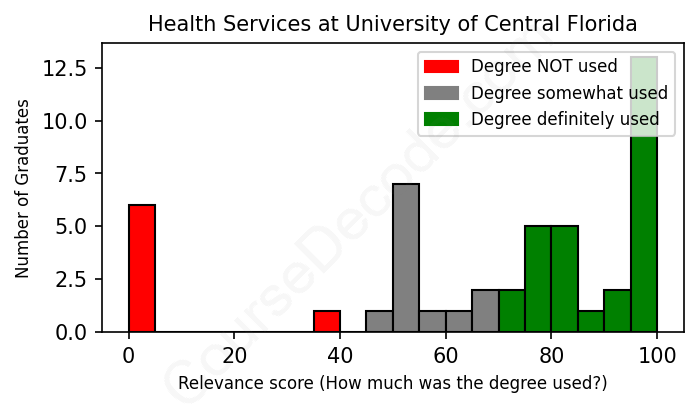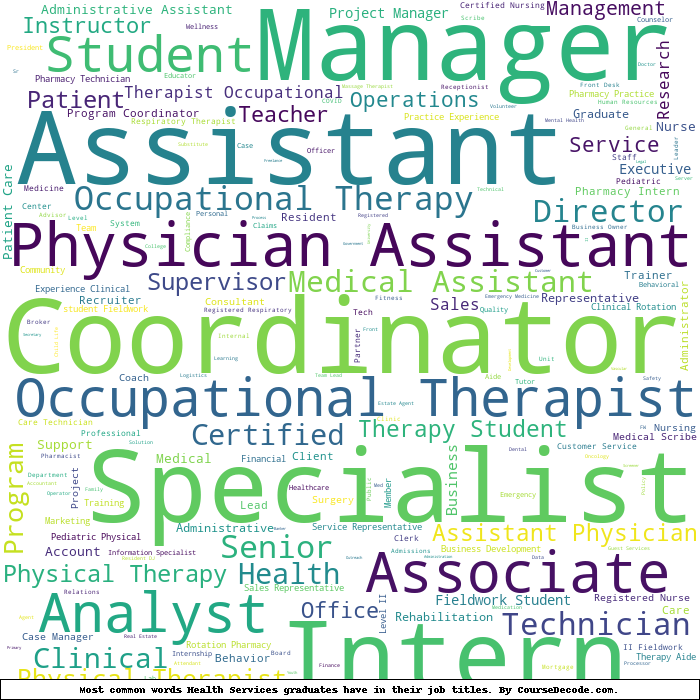
First, some facts. Of the Health Services graduates from University of Central Florida we've analyzed , here's how many have used (or NOT used) their degree in their career:

These are estimates based on AI analysis of 47 LinkedIn profiles (see below).
The verdict? Slightly above average. Overall, with an average relevance score of 68%, Health Services graduates from University of Central Florida have a slightly higher likelihood (+1%) of finding work in this field compared to the average graduate across all fields:
And for comparison, here's the chart for all profiles we've looked at across all degrees.
Also, after graduating, 51% of these graduates have pursued further education other than another Bachelor's degree (such as a Masters degree or other), compared to the average across all profiles of 35%. This suggests you may need more than just a Bachelors degree to be competitive as a Health Services graduate.
See the details:
|
Relevance score: 100% We think this person has gone into a career highly relevant to their degree. We think this person has gone into a career highly relevant to their degree.
DEGREE INFOGraduated in 2013 from University of Central Florida with a Bachelor's degree (B.S.) in Health Services. Also pursued further education since (see below). JOB HISTORY SINCE GRADUATIONChiropractic Physician Jordan Chiropractic and Geriatric Care Center LLC May 2023 - Present FURTHER DEGREES DONE SINCE GRADUATINGDoctor of Chiropractic (D.C.)Palmer College of Chiropractic 2013 - 2017 Masters Degree Public Health Administration-Concentration in Functional Nutrition (MPHFN) Everglades University 2018 - 2020 ABOUTNo information provided. |
The top 10 most common jobs done by the graduates we've analyzed (ranked most common to least) are:
When we look at the types of jobs that graduates from the University of Central Florida have taken after earning their degree in Health Services, it’s clear that there’s quite a variety. Many of them have gravitated towards roles that are directly relevant to health services, like physical therapists, medical assistants, and healthcare managers. These positions utilize the skills and knowledge they gained from their studies, allowing them to contribute to the healthcare field in meaningful ways. You’ll also find quite a few people working as EMTs or in various forms of patient care, which shows a strong connection to their education. These roles not only leverage their academic background but also provide hands-on experience that can be crucial for career advancement.
However, there are also many graduates who have taken paths that seem less connected to their degree in Health Services. Some ended up in jobs like guest services, administrative roles, or even positions in sales and marketing, which don’t necessarily utilize health services knowledge. While some of these roles might benefit from general communication and management skills, they don’t require the specific healthcare expertise gained from their education. Overall, while a good number of graduates are working in jobs that relate directly to health services, there’s a noticeable portion who have veered off into unrelated fields, highlighting the diversity of career paths available after graduation.
Here is a visual representation of the most common words in job titles for Health Services graduates (this is across all Health Services graduates we've analyzed, not just those who went to University of Central Florida):

Graduates from the University of Central Florida's Health Services program seem to have a varied but mostly positive trajectory in their careers. Many of them land jobs right after graduation in areas closely related to healthcare, like physical therapy, medical assistance, or case management. For example, several graduates quickly move into roles as physical therapists or assistants, which aligns perfectly with their degree. Others find themselves starting in healthcare administrative roles, such as program managers or coordinators, indicating a shift toward the administrative side of health services.
As time goes on, many of these graduates progress in their careers, often staying within the healthcare field. In fact, you might notice that those who pursued roles in large healthcare organizations, like AdventHealth, climb the ranks to positions with more responsibility, such as directors or managers in strategic roles. However, not everyone remains in the health services sector; a few have ventured into unrelated areas like title agencies or entertainment, which suggests some graduates may be exploring varied interests or finding opportunities beyond healthcare. Overall, it seems that most graduates are doing well, either solidifying their careers in health services or diversifying into other fields, so it's a fairly positive picture."
Honestly, a Bachelor’s degree in Health Services at the University of Central Florida is about average in terms of difficulty. It requires a solid understanding of both health topics and management principles, but it’s definitely manageable if you stay organized and keep up with your coursework. There are some challenging classes, especially if you're not super into science or statistics, but overall, most students find it more about consistency and less about pure brainpower. So, if you’re interested in the subject and willing to put in the effort, you’ll likely do just fine!
Most commonly, in the LinkedIn profiles we've looked at, it takes people 4 years to finish a Bachelor degree in Health Services.
Looking at the job paths of these Health Services graduates from UCF, it seems like they are generally carving out solid careers, though income varies significantly depending on the field and specific roles. For example, some are climbing the ranks in healthcare with positions that are likely paying well, like the Administrative Director and Director roles at AdventHealth. Others are in more entry-level positions or roles with potentially lower earning potential, like the DJ gig or guest services roles. Overall, it looks like some graduates are making decent money as they progress in their careers, particularly those in healthcare settings, while others may still be in the earlier stages of their careers and earning less. So, there's a mixed bag here, but plenty of potential for those who stick with it!
Here is a visual representation of the most common words seen in the "about" section of LinkedIn profiles who have a Bachelor degree in Health Services (this is across all Health Services graduates we've analyzed, not just those who went to University of Central Florida). This may or may not be useful:

Here are all colleges offering a Bachelor degree in Health Services (ordered by the average relevance score of their Health Services graduates, best to worst) where we have analyzed at least 10 of their graduates:
| College | Score | Count |
|---|---|---|
 The Ohio State University The Ohio State University
|
88 | 14 |
 Quinnipiac University Quinnipiac University
|
88 | 10 |
 Grand Valley State University Grand Valley State University
|
87 | 16 |
 University of Tampa University of Tampa
|
87 | 10 |
 Stony Brook University Stony Brook University
|
80 | 15 |
 Boston University Boston University
|
79 | 12 |
 University of Connecticut University of Connecticut
|
78 | 26 |
 Florida Agricultural and Mechanical University Florida Agricultural and Mechanical University
|
76 | 12 |
 Texas A&M University Texas A&M University
|
72 | 16 |
 University of South Florida University of South Florida
|
72 | 26 |
 Boise State University Boise State University
|
71 | 11 |
 University of Central Florida University of Central Florida
|
68 | 47 |
 Florida Gulf Coast University Florida Gulf Coast University
|
68 | 10 |
 James Madison University James Madison University
|
66 | 26 |
 University of Missouri-Columbia University of Missouri-Columbia
|
66 | 17 |
 California State University, Fullerton California State University, Fullerton
|
66 | 13 |
 California State University - East Bay California State University - East Bay
|
66 | 10 |
 Arizona State University Arizona State University
|
62 | 10 |
 Cleveland State University Cleveland State University
|
60 | 10 |
 Stockton University Stockton University
|
58 | 12 |